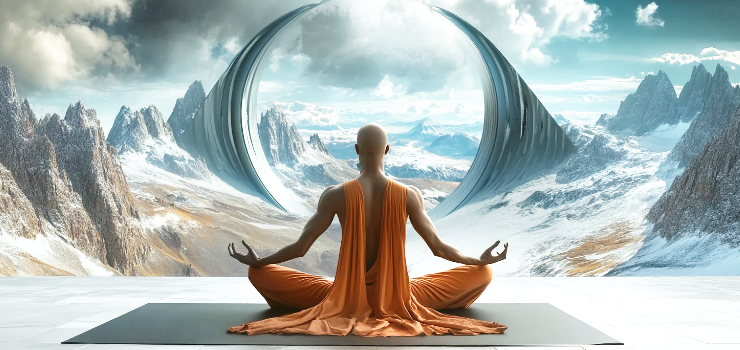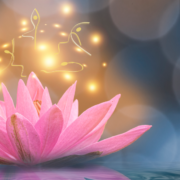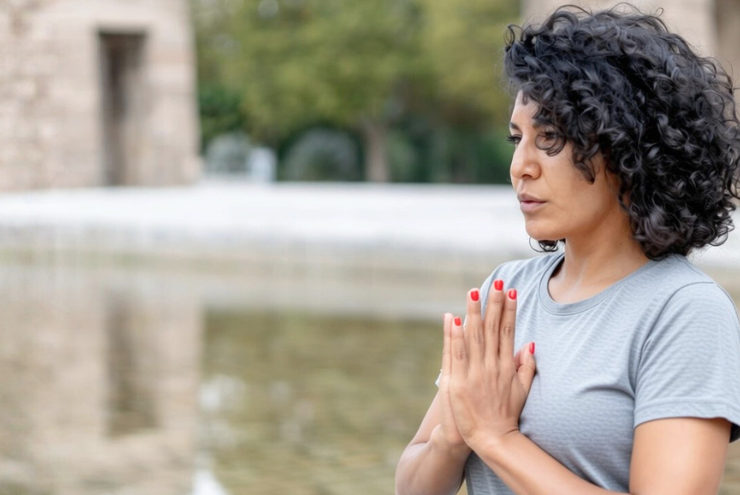AI in yoga: Can we trust AI to be accurate?

Within the past year, it seems that every service I use to make images, proofread text, or send emails has tried to integrate AI into their offering one way or another. I am constantly encouraged to improve my messaging, get inspiration, and make more of an impact by letting AI write my copy, create my images, and help me in a myriad of other ways. After a lot of badgering, I decided to give it a try when I was writing text for my yoga series about the mind, which I originally dubbed as Jedi Yoga. I had asked an AI service to describe a connection between a Jedi Warrior and yoga. Among other things, AI wrote: “George Lucas, the creator of the Star Wars franchise, has revealed in interviews that the traditions of Buddhism and Hinduism shaped the foundation of his movies. The characters in the Star Wars universe are complex manifestations of classical Eastern thinking, represented through the use of archetypal motifs like The Force, which is similar to Qi or Prana, and the concept of karma. George Lucas had been practicing yoga for decades because he believed that understanding the tradition of yoga could open one’s mind to explore possibilities previously unknown. He had also opened a Jedi Academy in Austin, TX, where aspiring Jedi Warriors can sharpen their skills.”
“Wow, that is amazing!” I thought. “I want to know more about this Academy.” Turns out it doesn’t exist. AI had just made it up because it sounded plausible. This is a fairly common occurrence when AI makes up stuff, including facts, books, events, scientific articles, etc. This phenomenon is called “AI hallucination.” AI can hallucinate anything and present it as reality. The tech companies are trying to curb it, but it’s rather difficult because, ultimately, it’s a feature, not a bug. Computer science professor Charles Lee Isbell Jr., an interactive AI expert and a provost of the University of Wisconsin–Madison, notes in response to those who point out that occasionally ChatGPT “hallucinates” and “makes things up”: “It’s always making things up. It just so happens that the things that it makes up sound reasonable most of the time.” (1)
This is a bit of a problem when you do not know for sure which part of the text AI produces is based on reality and which part is completely made up. In my example above, the Jedi Academy wasn’t true; what about other stated facts? Does George Lucas really practice yoga? Was he influenced by Eastern thinking? Ultimately, I decided to drop the Jedi Yoga idea altogether and instead write the text myself based on what I know from my yoga training, text studies, and my personal experience. I felt much more confident in what I produced.
Incidentally (or not), this is exactly how the idea of correct information (pramana) is described in the Yoga Sutras. Sutra 1.7 states Pratyaksha anumana agamah pramanani. It basically answers the question: How do you know if something is true or not? The sutra suggests a three-pronged approach. You know that something is true if it is confirmed by three sources: anumana (inference or deductive reasoning), agamaha (authoritative testimony, which includes experts in the field, authoritative texts, etc.), and pratyaksha (your direct experience). I feel that it is particularly important to utilize all three nowadays with the proliferation of misconceptions, mistruths, and outright lies in our shared information space. AI cannot have direct experience, so it relies on inference (when something sounds plausible) and authoritative testimony (in the form of “somebody on the internet had written/said that”). You can imagine the kind of output this can produce 🙂 And when there is no authoritative testimony on a particular subject, AI just makes it up to give more weight to its argument.
It’s one thing to let AI proofread our writing or produce a marketing copy for a newsletter; it’s another thing completely if we allow it to direct our yoga practice or yoga teaching. There are already plenty of products/services on the market that promise great benefits from integrating AI into yoga. Should we join the hype? Will AI yoga teachers replace us soon? Or can we use AI as a tool to improve our offerings to our students? Let’s explore together over the next several weeks.
References
- What is AI? Everyone thinks they know but no one can agree. And that’s a problem by Will Douglas Heaven









